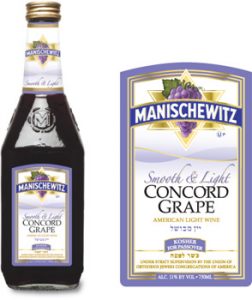
During this year’s Passover, some of you will probably have a glass of
Manischewitz, a peculiarly sweet kosher wine often associated with Passover. There are, however, kosher alternatives to Manischewitz many people are unaware of (Unless you've read
our previous post on kosher wine!). The idea that all kosher wines are eminently sweet is simply untrue. When kosher wines (like Manischewitz) were first made in America, the incoming Jewish population had little time--and few resources--to produce wine quickly for religious holidays, as well as the regular Kiddush ritual. Since Jewish immigrants also tended to settle in areas that were not conducive to growing grapes, early kosher winemakers in America had but a handful of varietals at their disposal. Because of limited time, tools, and grapes, the resulting wine was often less-than ideal, so it was sweetened until palatable (It often came to this, or drinking a raisin wine!). From there, all it took was one generation in America to associate kosher wines with sweetness. During passover, Manischewitz is still sweetened with cane sugar.
The majority of European kosher wines, on the other hand, are not sweetened. They also tend to incorporate more grape varietals. It’s possible to pick up a decent bottle of kosher Cabernet, Bordeaux, Merlot, and even Pino Grigio! Though kosher wine has tended to be slightly lighter in body and color than non-kosher wine, with today’s advances in winemaking technology this “lightness” is quickly disappearing. Examine a glass of Fernandez de Arcaya Galdiano Alate Navarra 2006, for example, to see a delightful Tempranillo with excellent color! Though tradition may dictate a glass or two of sweetened Manischewitz this Passover, the larger world of kosher wine is certainly worth exploring. May you and your family be delightfully surprised by today’s abundance of quality, kosher wines!

 During this year’s Passover, some of you will probably have a glass of Manischewitz, a peculiarly sweet kosher wine often associated with Passover. There are, however, kosher alternatives to Manischewitz many people are unaware of (Unless you've read
During this year’s Passover, some of you will probably have a glass of Manischewitz, a peculiarly sweet kosher wine often associated with Passover. There are, however, kosher alternatives to Manischewitz many people are unaware of (Unless you've read 